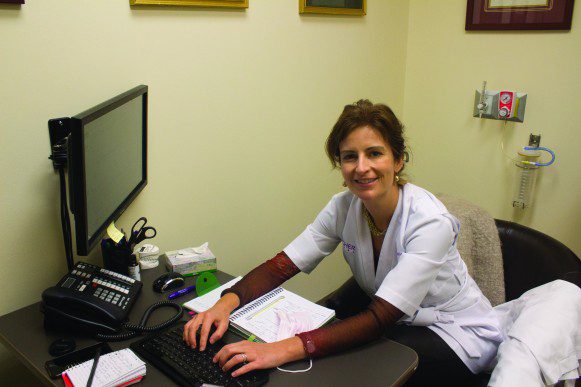Dr. Natalie Archer is intimately aware of the latest form of elder abuse, especially when she hears the excuses from the caregivers of some of her older patients.
“Well, my dad doesn’t talk, so he doesn’t need to have dentures,” the local dentist recounted. Or, “She’s been on IV fluids, so she just drinks out of a straw.”
Having practised mobile geriatric dentistry for a decade in Ontario, Archer operates two clinics in Toronto – one in Runnymede and one in Rosedale – each specializing in geriatric care. She treats patients from across Toronto, including East York.
“We see a huge number of (older) patients here who just can’t eat basic foods,” Archer said. “It affects your willingness to live. It prevents them from being sociable. It prevents them from smiling and being confident.”
Because the problem appeared to be widespread, some time ago Archer initiated the Dental Elderly Abuse Response (DEAR) Project to addresses the pitfalls of dental care in the seniors of Toronto.
“It was just a big black hole and that inspired me to start this,” she said.
The DEAR Project is supported by the Canadian Centre for Elderly Law (CCEL) and the National Initiative for Elderly Care (NICE). Laura Tamblyn Watts, a senior fellow at CCEL, represents the legal side of the project.
“It became very clear, very early on, that dental elder abuse and neglect, and particularly neglect, was probably the most prevalent form of abuse and neglect in Canada,” she said.
DEAR’s research shows that almost one in three senior dental cases involves abuse or neglect, and yet it is is the only project of its kind.
“What we wanted to do with the project,” Watts said, “was (to) connect with older adults, their families and caregivers, as well as dentists, to bring the conversation about the legal aspects and the responsibility aspects together.”
Archer explained that as people age, they tend to have a dismissive attitude about dental problems. This can present real problems if the attitude is shared by a caregiver.
“If you think about it, everything you eat, everything that goes in, the bacteria, who you kiss, it’s all focused on the mouth,” she said. “Everybody has the right to a healthy mouth, and everybody has the right to a pain-free mouth.”
Canadians are used to having relatively easy access to dental care. When patients need a toothache attended to or a teeth cleaning, they can walk into a dentist’s office and remedy the situation. However, some older patients may face mobility issues. Others may lose contact with a regular dentist. In short, they are no longer in control of how to care for their teeth get. The DEAR Project strives to change that.
Archer said her greatest concern is when “somebody’s making decisions on (an older patient’s) behalf that I truly don’t think are those patient’s wishes.” She can immediately tell when a patient, who used to be regular with his or her dental care, has suddenly been abandoned.
“There’s a disparity there and so I have to be the advocate for the patient and look after the situation,” she said.
Watts blames a general neglect and ignorance of such elder dental issues for the problem.
“People don’t know about the issues of capacity. They don’t know about the issues of advanced care planning. And they don’t know the effect really on geriatric dental health,” she said. “Older adults are being abused and neglected either on purpose or through lack of understanding and lack of knowledge and we’re really trying to do something about it.”
So a fundamental objective of the DEAR Project is to educate people about the issues of capacity and consent. The project has delivered several knowledge mobilization tools so far, and has made advanced care planning tools available on its platforms online.
“I think our approach is educative. It’s definitely not punitive,” Archer said.
She said she has fears about the way the DEAR Project will be received, in particular that people will feel judged whether they are caregivers or seniors themselves.
“I definitely don’t want people to feel that way,” she said. “We’re here to help. We’re here to educate and I think we’re making some great headway here, getting people smiling. Everybody should be smiling.”

